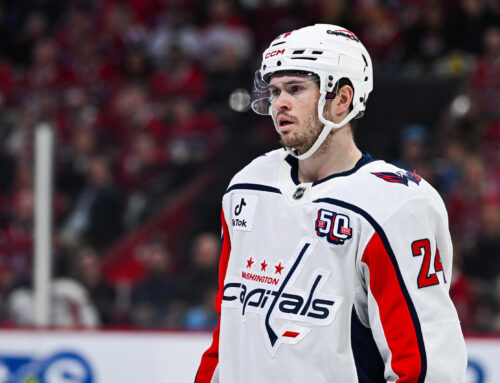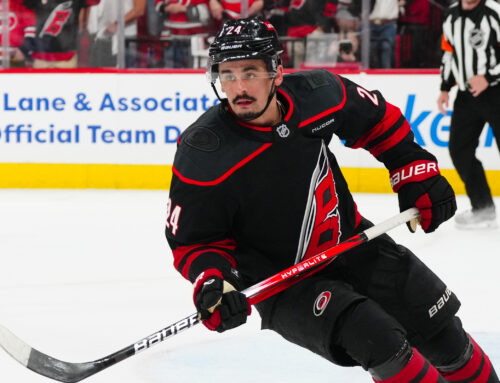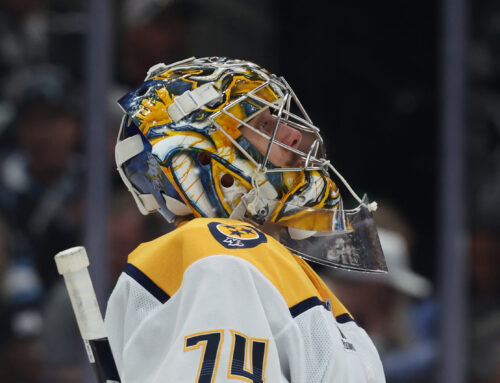
Although much of the focus this time of year is on unrestricted free agents, the restricted ones can also play a huge role in the future of your fantasy team in cap leagues.
After all, it doesn’t take much for a GM to pay a young player a lot of money based on potential. There has been plenty of focus on players such as Mark Stone, William Nylander, Connor Hellebuyck and William Karlsson and what their new contracts might look like.
I wanted to mix it up a bit and look at RFAs that don’t necessarily demand the top news stories. This list is focusing on players who had less than 45 points (and a backup goaltender in one situation).
10. Ryan Spooner
Spooner might have posted the quietest fantasy-relevant season of anyone this past year. His 41 points may not look impressive, but he did it in only 59 games split between Boston and the Rangers. That paces out to 57 points over 82 games. He also posted 16 points in 20 games once he went to New York and started getting some extra ice time (he averaged 14:29 with the Bruins and 16:51 with the Rangers).
9. Brady Skjei
After a promising rookie season when Skjei put up 39 points despite limited power play time, the defenseman’s fantasy value took a huge nosedive last summer when the Rangers signed Kevin Shattenkirk. So, this season, Skjei became more defensive minded (his blocked shots went from 69 to 119 while his shorthanded ice time average went from 18 seconds to 1:31 per game). There’s still some value there in fantasy leagues that count peripherals, but if his new contract is an overpayment, you are better off letting someone else take him.
Bjorkstrand had a bit of a breakthrough season, notching 40 points and nine power-play points and finding some chemistry with former 70-point player Nick Foligno. Unfortunately, even averaging two shots a game, Bjorkstrand isn’t really fantasy relevant in many leagues right now. He’ll probably sign a cheap short-term deal to see if he can continue to grow his game.
7. Jimmy Vesey
The CBA is a funny thing. Two summers ago, Vesey was an unrestricted free agent as he didn’t sign a contract with Nashville after four years at college. He wound up signing with the Rangers for two years at $3.775 million per year but is now a restricted free agent. He’s been a huge disappointment since going to the Rangers, playing on the third line and averaging 28 points per season.
6. Ondrej Kase
Of all the RFAs still left to be signed, only three had at least 30 points while playing less than 14 minutes a game: Miles Wood (30 points, 12:27 per game), Ryan Hartman (31 points, 12:48 per game) and Kase (38 points, 13:57 per game). However, Kase only played 65 games, meaning he was on pace for 48 points over 82 games. That’s pretty good output from a third-line player. As Michael Clifford pointed out in the Friday ramblings, Kase could have a good shot at top-line minutes this upcoming season if Corey Perry continues his decline.
Nurse is simply a beast when it comes to fantasy. His 26 points were easily a career high, but he also notched a plus-15, 67 PIM, 194 shots, 161 hits and 153 blocked shots. He also believes he has another level when it comes to offense, although he didn’t get a single power play point when given the opportunity. The Oilers have only $5 million in cap space this year, and only $17 million in 2019-20 with only 13 players signed. The Oilers need Nurse to take a favourable contract, but no matter what he signs for, the contract will be favourable for you.
Can Vegas afford to pay Theodore as a number one defenseman even though he hasn’t put up #1 defenseman numbers? It seems as everyone believes Theodore is the future of the Knights defense, but the squad seemed to have done just fine with the 26-year-old Nate Schmidt and 25-year-old Colin Miller leading the show. Miller just signed a four-year deal that pays him just under $4 million a season. Can Theodore command that much? Even though Theodore led the team in power play ice time per game, he was third in power play points per game.
3. Tom Wilson
Fantasy general managers in peripheral leagues should be willing to accept almost any kind of pay raise for Wilson. When he lines up with Alexander Ovechkin, he gets a little more offense (14 goals and 35 points this year, followed by five goals and 15 points in 21 postseason games). But you don’t come for the offense, you come for the physicality. In the regular season, he had 187 PIM, 123 shots and 250 hits. Not only was he second in PIM and fourth in hits, no other player hit triple digits in all three categories, making Wilson an extremely valuable commodity.
2. Juuse Saros
Saros is intriguing because this contract could go a long way to determining how confident the Predators are in handing Saros the reins in a year. Next summer, Nashville number one netminder Pekka Rinne is an unrestricted free agent (although a new deal can be signed at any time now). Saros has been good as a backup, but Rinne has posted better numbers, plus was this year’s Vezina trophy winner and is only a year removed from bringing the Preds to the Stanley Cup finals. If you’re the Preds GM, you have to go with the guy with the most recent success, don’t you?
1. Jacob Trouba
Trouba is easily the most interesting restricted free agent out there. In the summer of 2016, he was a restricted free agent and sat out the first few games of the season. He wanted a trade so he could be a top-two defenseman instead of being stuck behind Dustin Byfuglien. In the end, he signed a two-year, $6 million contract. Since then, he hasn’t really proven much and Winnipeg could be in cap trouble in as they have to sign Blake Wheeler, Patrik Laine, Kyle Connor and Connor Hellebuyck over the next two summers. However, in fantasy circles, even if Trouba gets a significant pay raise (say $6 million), he is undoubtedly worth that in leagues with peripherals as he hits, blocks shots and takes a lot of shots.





 FLA
FLA TOR
TOR CAR
CAR WPG
WPG DAL
DAL EDM
EDM WSH
WSH
